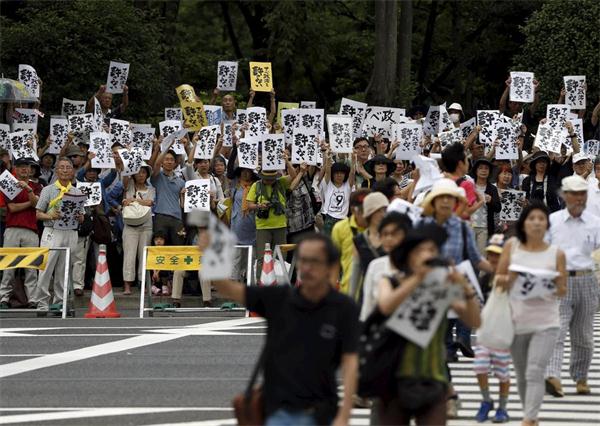Abe gambles on war mongering
Updated: 2015-07-21 15:47
By Martin Sieff(chinadaily.com.cn)
|
|||||||||
 |
|
Protesters raise placards during a rally against Japan's Prime Minister Shinzo Abe's administration and his security-related legislation outside the parliament building in Tokyo July 18, 2015. Placards read in Japanese "Abe politics is unforgivable". [Photo/Agencies] |
Japanese Prime Minister Shinzo Abe is a gambler. In domestic politics, he has won more often than he has lost. But now he is throwing the dice more wildly with dangerous issues at stake.
In Japan’s annual defense white paper on Tuesday, China was described as a threat in escalating regional tensions, which is apparently a move to drum up support for the controversial security legislation.
Last week, he rammed a series of controversial security-related bills through a special committee of the lower house of the Japanese parliament. If the full Diet, or parliament, approves them, Japan’s armed forces will be free to operate outside their borders for the first time since the end of World War II.
This issue is far greater than any comparable action taken by any German government because, unlike every German chancellor from Konrad Adenauer to Angela Merkel, Japan has never truly faced up to its genocidal aggression in China and other Asian countries from 1937 to 1945 that cost more than 20 million lives.
The US has not heeded China’s warnings, and taken no steps to rein Abe in. On the contrary, US President Barack Obama and his lieutenants are encouraging him. They are recklessly charging into every situation — from greater military commitments against the Islamic State in the Middle East to an entirely avoidable but ever more dangerous confrontation with Russia.
In such times, it seems to make sense to US policymakers to let their loyal ally Japan do the dirty work of seeking to “contain” or “intimidate” China for them.
But both Obama and Abe are disastrously wrong.
First, Abe’s move is not supported by his own people. With continuing peace and prosperity and a low birth rate, Japanese people today do not share Abe’s antiquated dreams of militarist glory. Polls show that well over half the Japanese public rejects his drive to abolish Article 9 of the postwar Constitution.
Since Abe’s spend-and-borrow economic policies are driving the Japanese economy ever closer to unprecedented crisis, he could be in for an unprecedented public rejection, only a few months after his greatest electoral victory.
Second, Abe is biting off far more than he can chew. Japanese policymakers have entirely forgotten the lessons they learned the hard way against China and the US during WWII — that it is far easier to get sucked into a war overseas than to end it. The US learned that lesson in Vietnam, promptly forgot it, and is now relearning it all over again in Iraq and Syria.
Abe’s moves to open the way to sell large numbers of weapons to other East Asian states will, no doubt, be good news to Japanese industrialists and arms manufacturers in the short term. But it will inevitably lead Japan into trying to prop up a range of governments against domestic as well as external threats that will have nothing to do with China.
Japan has an excellent navy, but its army remains relatively small and the Japanese public does not want to see steadily escalating casualties among its young soldiers.
Japan simply lacks the size, the resources and the national attitude to try to impose its will on the societies of East Asia in the 21st century. In trying to force through such a strategy, Abe is trying to make bricks without straw.
The Japanese prime minister’s policy is certain to backfire on the US, too, for any gains Japan’s companies make by selling arms to Asia-Pacific states will be at the expense of the US.
Last year, the US’ total annual trade deficit with the rest of the world was $505 billion. The last thing Washington needs is to see one of its few areas of strong sustained exporting strength US — arms sales and related military equipment — undermined by a strong competitor it had encouraged itself.
The US is also likely to see the dangerous nationalist passions it is complacently supporting in Japan turned against itself sooner rather than later. This is another lesson from the great catastrophes of 75 years ago that has been totally forgotten in Washington.
The author is chief global analyst for the Globalist and a senior fellow of the American University in Moscow.
Related Stories
Shinzo Abe slashes 7 decades of pacifism, switches Japan to war mode 2015-07-16 15:48
Demonstrators protest against Abe's security bills 2015-07-17 11:34
Abe gov't forcing war bills triggers anger 2015-07-16 09:14
President Xi invites Japanese PM Abe to attend victory celebration 2015-07-11 00:20
Today's Top News
Inspectors to cover all of military
Britons embrace 'Super Thursday' elections
Campaign spreads Chinese cooking in the UK
Trump to aim all guns at Hillary Clinton
Labour set to take London after bitter campaign
Labour candidate favourite for London mayor
Fossil footprints bring dinosaurs to life
Buffett optimistic on China's economic transition
Hot Topics
Lunar probe , China growth forecasts, Emission rules get tougher, China seen through 'colored lens', International board,
Editor's Picks

|

|

|

|

|

|







